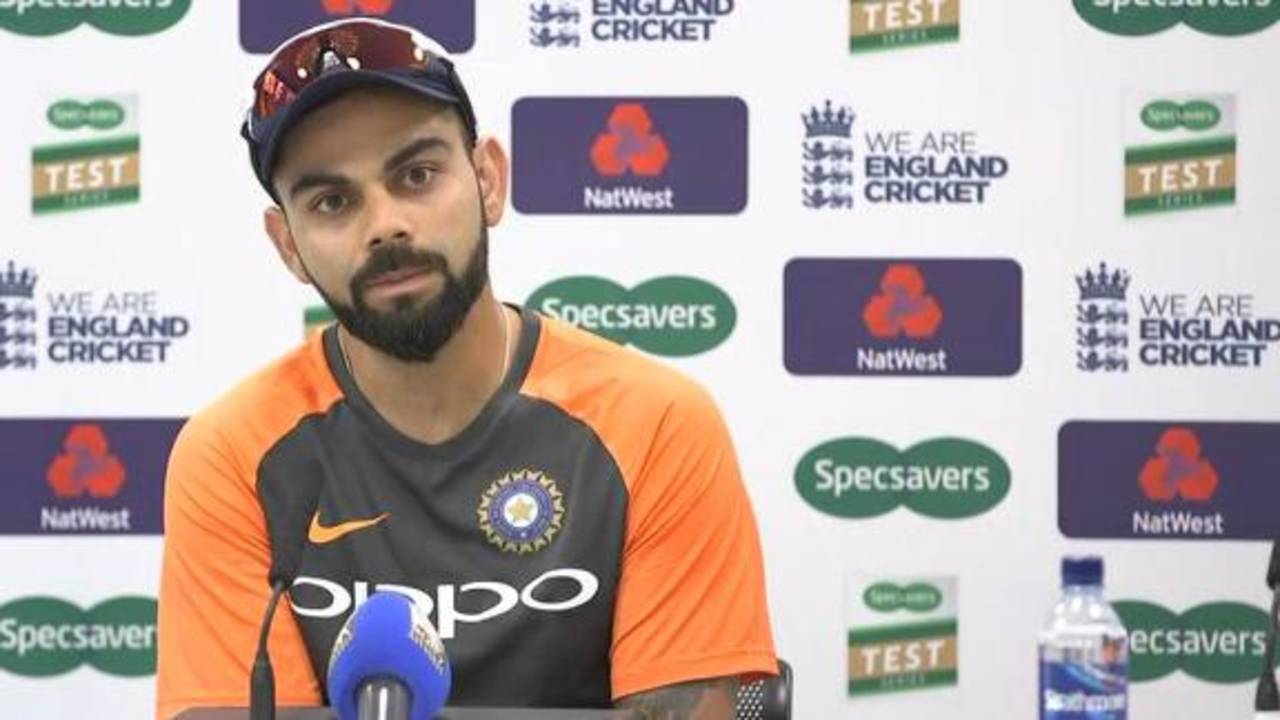Kohli demands 'composure', not 'aggression' from his batsmen
After failing to "cross the line" in the series opener, the India captain said greater application in the first 30 balls could turn the tide for India's frontline batsmen
Nagraj Gollapudi at Lord's
08-Aug-2018
How do India cross the line? How do they emerge victorious?
Virat Kohli's India have come close to crossing that line in overseas Tests twice in a matter of eight months. In the first Test of the South Africa tour, set 208 to win, India lost by 72 runs in Cape Town. Last Saturday, at Edgbaston, needing 194 to take a 1-0 lead, India fell short by 31 runs.
At Edgbaston, Kohli was the only Indian batsman to succeed, the only batsman on either team to score a century, followed by a fifty in the second innings. Despite those honours, it must have hurt him to still end on the losing side. Kohli admits it did - not because his batsmen failed, but because India lost.
"It is unfortunate that we haven't been able to cross the line after being so close," Kohli said ahead of second Test. "That is the only thing we are looking at as a side: how we cross the line. It doesn't matter whether I get runs or Jinks [Ajinkya Rahane] does or [M] Vijay does or KL [Rahul] does or whoever in the batting order. As long as we cross the line, that is the only thing that matters."
None of those batsmen Kohli named nor Shikhar Dhawan, who are the frontline batsmen in the line-up, managed to survive long enough in either innings to make a difference. In both innings, Kohli played the anchor as well as the shepherd to the lower order to impart a semblance of respect to the Indian batting.
Still, Kohli pointed out it would be unfair to judge his fellow batsmen for their failure so quickly. Asked if the batsmen failed to show mental discipline or the heart to fight or lacked anything on the technical front, Kohli said there was no such "pattern".
Kohli, however, admitted that the Indian batsmen ought to be mentally stronger, especially facing the first 30-odd deliveries. That, he said, would be key to starting and building an innings.
"It is not so much about the technical, but more about the mental aspect," he explained. "How you think about the situations, about the first 20, 25, 30 balls, after the fall of a wicket, matters a lot. You must have a clear plan about what to do in those 30 balls, and, more often than not, that plan should not involve aggression. We need to focus on composure, which as a batting unit we have discussed."
The fact that Kohli touched upon aggression was revealing. Batsmen like Dhawan and Rahul played with hard hands and away from the body, attempting to score early on in their innings, which proved fatal. Without pointing fingers, Kohli presented his own example from the past when he would get distracted with stray thoughts while preparing to play the ball instead of playing it on merit.
But now, Kohli said, he backed his ability to extend his stay at the crease. "It is just about going out and being positive about every situation that you are in and not thinking too much about what is going to happen. It is about looking at the ball and reacting according to the ball. Sometimes, as a batsman, where I have faltered in the past is I have thought maybe I will get a good ball somewhere and lose sight of what I need to do at that particular time.
"That is something that has pulled me back. But now I am in a zone where I have to respect a good ball and just back my ability and play for as long as I can. It is not that you can't get out in sport and in cricket. You just have to try and delay that eventuality as much as possible which as batsman we all try and achieve."
Nagraj Gollapudi is a deputy editor at ESPNcricinfo
